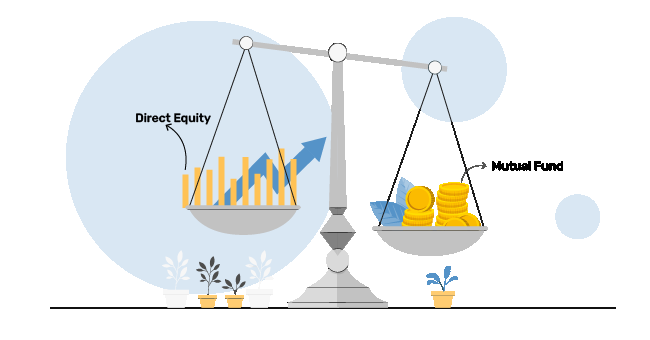We all know that equities offer a direct participation in the stock markets while equity oriented mutual funds offer an indirect participation. However, the difference does not end there. There are a number of ways in which the direct equity investment is sharply different from mutual fund investing. Here we look at the difference between equity and debt mutual funds and also we look at what is the difference between equity and mutual fund?
Equities for whom; and mutual funds for whom?
Honestly, any eligible investor is allowed to invest in direct equities and in mutual funds, but there has to be a method to the madness. Typically, direct equities are bought through the demat account, while the mutual funds can be bought and held as units in statement form or in demat form. Direct equity is for the more well-informed investor. If you are comfortable in self-trading, understand the markets and inherent volatility and willing to wait for a long time, then equities are for you. However, if you feel you cannot spend time and energy evaluating companies and markets, then prefer mutual funds. Generally, mutual funds are a better choice as they are professionally managed and come with various benefits.
Investing in direct equities and MFs – The modus operandi
To buy and sell direct equities, you need a demat and trading account. You can also trade intraday in the trading account, but that is not exactly investing. Today it is possible to open and activate the trading and demat account in just one day. Once you buy shares, shares are credited to the demat account. However, mutual funds when bought can be held in statement form or in the demat account based on fund folios. Both Direct equities and Mutual funds require one-time KYC to be done.
Equity is a share of a company; mutual funds participate in a portfolio
In an equity share, you are part owner of the company. You earn dividends, earn capital gains from sale (if any), and vote at the AGMs. The mutual fund investor owns units of the mutual fund scheme, which is invested in a diversified portfolio of stocks. The MF investor neither gets dividend from the companies nor do they have any voting rights in the company.
Understanding stock prices versus mutual fund NAVs
The stock price of a company reflects perceived value. Stock price risk can be triggered by new orders, higher demand, lower supply, price hikes, higher dividends, earnings prospects etc. There are fundamental and technical factors that influence equity stock prices. Mutual fund NAV is the net value of assets (at market value) less liabilities and proportionate total expense ratio (TER). Stock prices are real time, but MF NAVs are derived out of end of the day prices of underlying stocks only.
Difference likes in the level of diversification
Diversification arises when the risk of the investor is reduced because the portfolio is spread across a variety of low correlated assets. When you invest in equities, you are virtually on your own. Investors have to worry about buying the right stock, holding it long enough, putting stop losses, managing risk, portfolio review etc. In a mutual fund, the fund manager creates a diversified portfolio of assets and also manages with the help of an expert team. Diversification lowers risk in any investment and hence is value accretive.
Are mutual funds more tax efficient than equities?
In tax implication terms, there is not much to choose between equity and equity oriented mutual funds. In both the cases the dividends are taxed as per the individuals applicable tax slab. Long term and short term capital gains are also treated similar as are the profit and loss write-offs. The only difference is the presence of Section 80C benefits on equity linked savings schemes (ELSS) in the mutual funds space. They offer tax exemption within the overall umbrella of Rs. 1.50 lakh but subject to lock-in of 3 years. There is no such facility in equities.
Equity and mutual fund – which foster discipline better?
No doubt, mutual funds score higher on the discipline front and that is largely thanks to the presence of systematic investment plans (SIPs) in mutual funds. The operation of the SIP is quite simple and it is the mutual fund that takes care of administering the SIP. One can also do SIP on direct equity but it is too cumbersome and anyways, the diversification can be a major issue in direct equities. Also, high stock prices can be tough to handle.
Equity and mutual fund – which enable better financial planning?
Here again, it is mutual funds that score over direct equities. The mutual fund SIPs simplify the financial planning task. Start with the goal, work backward to identify the investment needed, peg the right SIP to the goal and your job is largely done. Mutual funds offer variety of equity, debt, liquid, and commodity options so you have planning resources for each and every financial need; whether long term or short term and whether high risk or low risk.
To sum up, what is the essential difference between equity and debt mutual funds? It is largely about risk and asset fit. Both require effort and monitoring. Mutual funds are less demanding than direct equities. Also, mutual funds can prove to be an outstanding option if you are an amateur and looking to plan for your long-term feature. In fact, mutual funds have options to invest as per varying needs (wealth creation, surplus parking, safety and growth, etc.) of the investors whereas direct equities are highly tilted towards growth
Disclaimer: Mutual fund investments are subject to market risk, read all scheme-related documents carefully and consult with your advisor before investing.
